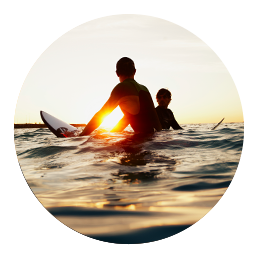 Shark activity map
Shark activity map
Switch on your Sea Sense.
Read more
Latest shark advice and warnings.
Read More










Shark Mitigation Strategy
The Western Australian Government is working with its partners to protect our beach-going lifestyle. It’s important that the surfers, swimmers and divers who love to use our amazing coastline can continue to do so, while understanding the facts about sharks and the hazards they present.
Western Australian Government
06 November 2013The safety of water users is a priority for the Western Australian Government.
While the risk of a shark attack is low, the State Government has implemented one of the strongest, evidence-based shark mitigation programs in the world, so that West Australians can continue to enjoy the beach and ocean with confidence.
Our shark mitigation strategy offers a comprehensive approach with a range of tools and actions to help keep ocean users and our coastal communities as safe as possible.
Safeguarding the community
Enjoy the beach and ocean with confidence
- Beach and aerial surveillance. $4 million funding in 2024/25 to Surf Life Saving WA to provide:
- Helicopter and beach patrols over metropolitan and South West beaches.
- Coordination of service and emergency responses via SurfCom communications centre.
- Jet skis and event support to assist evacuations when a shark is sighted.
- Personal shark deterrents for surfers and divers. The State Government has introduced a world-first shark deterrent rebate providing Western Australians with a $200 subsidy on scientifically proven personal shark deterrent devices.
- Beach enclosures. Beach enclosures provide a protected swimming area featuring a physical barrier to reduce the risk of a shark encounter and are designed to be non-lethal towards marine life. Seven beach enclosures have been installed with the assistance of the State Government and are currently in place.
- Surfing WA partnership. A shark mitigation partnership with Surfing WA provides funding for jet skis and drones for event patrols, as well as free first-aid training that is tailored specifically for surfers.
Rapid and effective response
Operational responses that are quick and effective
- Shark Response Unit. A specialised Shark Response Unit (SRU) has been developed within the State Government to respond to shark incidents and work with other first responders to improve warning notifications and responses, so they are continually improved.
- Beach Emergency Number (BEN) signs. BEN signs are being installed at key coastal locations across the State to provide specific location information to help improve emergency response times.
- Legislative ban on shark cage diving for tourism and other activities which may change the behaviour of sharks.
- Whale carcass management. Collaboration across government departments and land managers to tow carcasses that are adrift, when conditions are suitable, and a program to trial additional towing options. Where possible, small whale carcasses will be towed, when removal by land is not practical.
Science and research
Improving our understanding of shark movements and behaviour in WA waters
- Extended shark monitoring network. Our world-class Shark Monitoring Network provides near real-time alerts of tagged sharks when they swim within range of a shark monitoring receiver. The receiver network is located between Perth metropolitan area (including the Swan Canning Estuary) and Esperance. The receivers use the latest generation of digital receiver technology, which have an improved detection range, connect to the digital phone network and use solar power with a rechargeable battery.
- Shark tagging. Increased shark tagging to make the most of our Shark Monitoring Network as a public safety and notification tool. Our tagging program primarily focuses on white and bull sharks, but also includes tiger sharks. These target species are considered high risk as they are most frequently involved in serious shark bite incidents.
- Scientific non-lethal SMART drumline trial. A two-year trial of non-lethal SMART drumlines, based in Gracetown was independently evaluated by the WA Chief Scientist. It was determined that the technology was not effective as a shark mitigation measure in Western Australian conditions.
- Science-based approach.
- A seven-year shark monitoring research program on movements of white sharks off the Western Australian coast.
- $1.9 million spent on innovative applied research projects overseen by the Chief Scientist, and reported publicly.
- Correlation study between environmental factors and shark bites to inform our safety advice.
- A study of white shark population numbers in WA.
Sharing information
Delivering accurate and consistent near real-time information to water users on shark mitigation
- SharkSmart website provides the latest research, and safety information relating to sharks and includes a near real-time shark activity map highlighting the latest sightings and tagged shark detections.
- A new SharkSmart WA app has been launched so water users can easily check for the latest shark warning and safety information at their local beach.
- Integrated shark notification and response system provides near real-time information on shark sightings and tagged shark detections to land managers and the public, to assist people in making informed decisions about their water use.
- Sea Sense campaign to help water users 'Switch on their Sea Sense' to ensure they have a safer, more enjoyable beach experience. The campaign provides information on WA's shark hazard mitigation strategies, tips for water users to stay safe, as well as how to check for the latest shark information and how to report sightings.